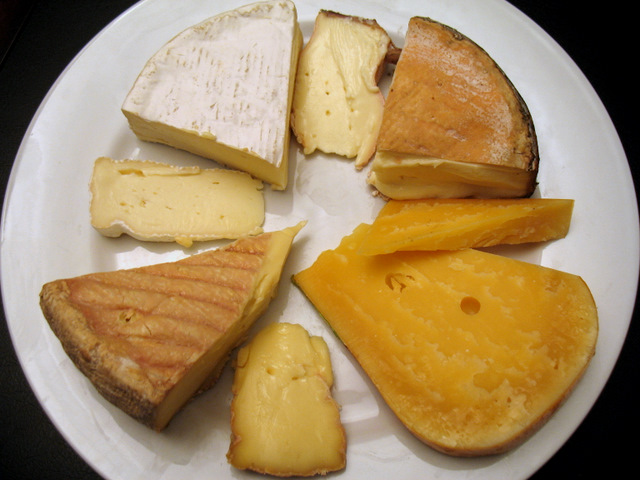
With 2015 firmly in the rearview mirror and a new year stretching ahead, many people are making ambitious resolutions to get healthy and slim down. If your friends are anything like mine, you probably know more than a few people who are embarking on diets and cleanses this month, many of which forbid the consumption of dairy, including cheese of all categories. While there are certainly people who truly cannot eat cheese for varying reasons, the broad dismissal of all cheese in the name of good health makes us sad. For your consideration, we offer three good reasons why you should resolve to eat artisan cheese all year long.
One: It’s a quality source of nutrition.
No, we’re not saying that tackling an entire pizza or pot of fondue is necessarily a healthy option. But the judicious consumption of cheese absolutely has nutritional benefits. Max McCalman, in his book Mastering Cheese, puts it like this: “Cheese is a delicious and tremendously efficient source of nutrition. It supplies many valuable nutrients, including proteins, sugars, vitamins, minerals, and trace elements. A 4-ounce piece of solid farmhouse cheese, for example, supplies more than half the adult nutritional requirements for protein, fat, calcium, and phosphorous as well as significant portions of vitamins A, B2, and B12. If you compare the nutritional content of a 3.5-ounce (100-gram) chunk of a hard, aged cheese such as Cheddar or Emmental to an equivalent amount of chicken eggs (two eggs are about 100 grams), the cheese contains about twice as much protein and one quarter the cholesterol.”
Two: Aged cheese may play a biological role in boosting your mood.
We went into this in detail in an earlier post, but here’s the gist: the crunchy bits so often found in aged cheeses, like Parmigiano-Reggiano and aged Gouda, are crystallized molecules of tyrosine, one of the amino acids present in milk. In the olfactory bulb of the brain, tyrosine reacts with certain enzymes to produce neurotransmitters like epinephrine and dopamine, which have profound effects on mood. So that smile on your face when you bite into a chunk of Comté Extra Grand Cru is not only due to its incredible taste—the cheese is actually making you happy on a chemical level.
Three: The best cheese is made by responsible farmers, who take care of the earth and bolster local food systems.
At Formaggio Kitchen, we believe strongly in the small producers who make the vast majority of our cheeses. Our cheese buying team has invested countless hours and extensive effort in building relationships with farmers and cheesemakers who treat their animals and their land with respect; we believe that their efforts result in tastier cheeses that are better for you, and better for the environment. Furthermore, supporting these small-scale makers directs money into the communities where the cheese is being made, thus boosting local economies. When you choose high-quality, carefully-made artisan cheeses, you can be assured that your purchase is supporting the work of dedicated, passionate producers and enriching small-scale food systems.
In short, including reasonable amounts of high-quality artisan cheese in a balanced diet is good for you, for your mood, and for the world. So raise a wedge with us and let's say it together: 'Eat more artisan cheese in 2016!'
Author - Jesi Nishibun is a cheesemonger at Formaggio Kitchen Cambridge. When she’s not behind the cheese counter, you can find her with her nose in a cookbook, or experimenting in her home kitchen.

